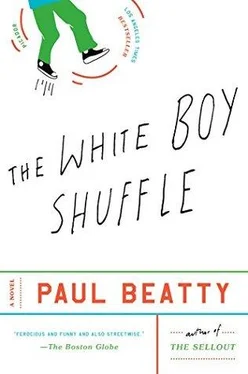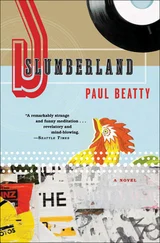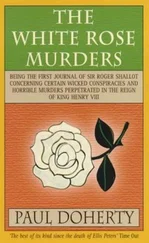“Buon giorno, Italia. Signore Kaufman, did you know that during last night’s reception for M’m’mofo Gottobelezi, Dexter Waverly killed himself in the college president’s office?”
“No.”
“ Si, si, he held a knife to his throat and demanded that President Filbey rip up the hundred-million-dollar check and spit in Gottobelezi’s champagne or he’d slash his throat.”
“And what happened?”
“Filbey ripped up the check and spit in the Zulu’s champagne. Signore Waverly apologized for the interruption, read a death poem dedicated to you, then plunged the knife into his throat.”
“Wow.”
“Don’t you feel responsible, Signore Kaufman? After all, it was your speech that inspired Signore Waverly.”
“I don’t know. What did the poem say?”
Death Poem for Gunnar Kaufman
Abandoning all concern
my larynx bobs,
enlightenment is a bitch.
“That’s not a bad poem. But I don’t feel responsible for anything anyone else does. I have enough trouble being responsible for myself. Besides, it looks like Dexter’s death prevented one hundred million dollars from being deposited in the National Party’s coffers.”
“ Bonjour, France. Monsieur Kaufman, but what about your endorsement of freedom through suicide?”
“My suicide, no one else’s.”
“Yes, but people are following your example. There are reports of black people killing themselves indiscriminately across the United States. Don’t you have anything to say?”
“Yes, send me your death poems.”
“ Hyuää huomenta, Finland. Mr. Kaufman, isn’t suicide a way of saying that you’ve — that black people have given up? Surrendered unconditionally to the racial status quo?”
“That’s the Western idea of suicide — the sense of the defeated self. ‘Oh, the dysfunctional people couldn’t adjust to our great system, so they killed themselves.’ Now when a patriotic American — a soldier, for example — jumps on a grenade to save his buddies, that’s the ultimate sacrifice. They drape a flag on your coffin, play taps, and your mama gets a Congressional Medal of Honor to put on the mantelpiece.”
“So you see yourself as a hero?”
“No. It is as Mishima once said: ‘Sometimes hara-kiri makes you win.’ I just want to win one time.”
“Last laugh?”
“I don’t see anyone laughing.”
“This is Namasté, India. And when do you plan to commit suicide, Mr. Kaufman?”
“When I’m good and goddamn ready.”
DURING THE READING PERIOD before finals, Scoby’s behavior became increasingly bizarre. The school psychologist’s diagnosis was acute homesickness, and she recommended that Nick move in with Yoshiko and me. At first I too thought he missed the old neighborhood. Scoby tried to recreate Los Angeles in Boston. He plastered most of the walls at school with poems torn from my book. He planted palm trees along Commonwealth Avenue, got run out of Roxbury when he tried to pay some Puerto Ricans to act Mexican for a day. He brought home exhaust from the public buses, which he’d bottled in five-gallon water containers, and released the noxious gases in the apartment. We took day trips to gloomy Revere Beach, sitting under the concrete veranda, complaining about the sun’s setting behind us. “Gunnar, I hate this place. Everything is ass-backward out here, man. Here we are in May, fully clothed at a beach with no waves. The best pro basketball player in the city’s history is white. The women like meek niggers. People eat thick soup, drink green beer. The cops are fat. The fire trucks are green. If I see one more fucking shamrock … It’s getting so bad I thought I saw a leprechaun near the river the other day.”
The obvious solution was for Nicholas to go home, but there was no home for him to go to; the man in the mauve suit had returned and convinced his mother to sell the house and travel the country, skating in an old-timer roller derby league. My mom offered to put him up, but he was too proud.
He often called himself the forty-eighth ronin. Nicholas Scoby was a masterless samurai who missed out on the revenge at Kira’s castle in the winter of 1702 and the mass seppuku two weeks later. “Gunnar, what would the forty-eighth ronin do if he was stuck out here in Boston, Massachusetts, home of the frappe and the grinder, masterless and alone?”
“He would kneel at the end of the Freedom Trail and stick a sword in his belly.”
“Exactly. Gunnar?”
“Yeah.”
“You serious about this whole death trip, winning by straight taking yourself out?”
“I guess so. I meant everything I said, but that don’t mean shit, you know. Don’t mean I’m right, wrong. The poems, the magazine interviews are just words, man. I’m just saying, Look, I’m outta here, all you motherfuckers who act like you give a shit — stop me, you care so much.”
“To kill yourself you don’t need a permit or anything like that, do you?”
“Naw, I don’t think so.”
Nick stared past the coastline, and my eyes followed his. The only thing barely visible in the foggy night was Boston’s pathetic skyline. The top of the glassy Hancock Building poked through a cloudbank that covered its lower floors in a vapory trenchcoat.
“Tallest building in Boston, right?”
“Fifty some-odd stories, the Sunday brunch from the top supposed to be the move. You can see to Newfoundland or some shit.”
“They don’t have no nighttime dinner thing?”
“Nope. Closed up.”
“What’s the second tallest building?”
“The Prudential Building, but I think BU’s law school is the third.”
“Can you get in there at night?”
“Yeah, during finals week the law library is open all night.”
We finished our beers, arguing over the finiteness of music. I rationalized that there are only so many notes and therefore only so many combinations of notes, so it stood to reason that there are only so many songs.
Scoby stood up, preparing to leave, wrapping his belongings in a towel. “Look, cuz, you not accounting for time. Time is what makes music infinite. Bip, bip, bap, tid, dit, tap is different from bipbip baaaaaap … tid daaat tap. See, if Charlie Parker had played Dixie, it would be like colorizing Birth of a Nation. It’d be a different tune but the same tune. You dig? You’d be hearing it differently and its meaning would change. Because a musician has they own sense of time and experience of time. For Parker, time was a bitch. He wouldn’t play Dixie as no happy-go-lucky darkie anthem. He’d play it as a ‘I’m mad and I know them cotton-picking niggers was mad,’ piss-on-their-graves dirge. You follow? That’s why your poems can never be no more than descriptions of life. The page is finite. Once you put the words down on paper, you’ve fossilized your thought. Bugs in amber, nigger. But music is life itself. Music is time. Played live, played at seventy-eight rpms, thirty-three and a third, backwards, looped, whatever. There’s no need for translation. You understand or you don’t.”
Scoby gave me a shake and a hug and left the beach, leaving his cassette player on my towel. I put the headphones on and drank beer, listening to Sarah Vaughan until the batteries started dying. Her voice slowed and garbled, deepened and faltered. I took a sip of beer and gurgled it in my throat. The sound was inside out, between my ears instead of outside them. Nothing was making sense. On the train home I wrote a reminder to myself to return the cassette player in the morning, then jotted down notes for a poem.
Dixie/“I wish I was in the land o’ cotton,
Читать дальше












